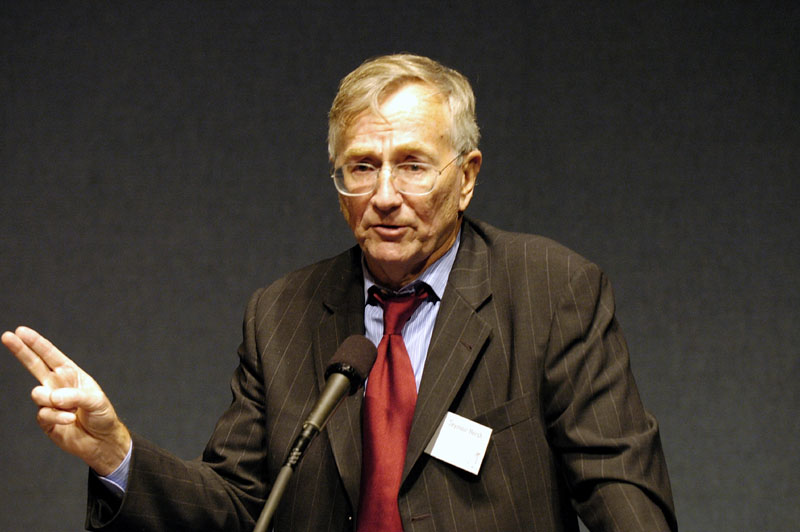Originally published at MintPress News.
CHICAGO — At 78 years old, Seymour Hersh remains one of the most important, controversial, and even cutting-edge voices in journalism. His newest report, which criticizes the official narrative of the capture and killing of Osama bin Laden, is just one revelation in a long history of undermining government propaganda through investigative reporting.
In the bin Laden report, published this month in the London Review of Books, Hersh accuses the United States of collaborating with Pakistan to orchestrate bin Laden’s capture and then covering up the real story with a tale of all-American heroism. Hersh’s account makes it clear that bin Laden was a pawn the Pakistani government traded to the U.S. in return for military aid, and the terrorist leader’s capture an almost theatrical event carefully managed by both governments for maximum positive publicity.
The White House previously maintained that the mission was carried out using only U.S. intelligence and troops, as mythologized in the Oscar-winning film “Zero Dark Thirty.” The Obama administration strongly denies the claims of collaboration, but already the mainstream media is confirming part of Hersh’s story.
On Monday, NBC News verified a key assertion — that in the year before bin Laden was killed, a Pakistani intelligence official approached the CIA with details about the al-Qaida leader’s whereabouts. According to NBC, three intelligence sources “say that the Pakistani government knew where bin Laden was hiding all along,” showing that Hersh’s article forces a major departure from previous network news reporting on the subject.
A history of exposing cover-ups and government lies
Hersh made a name for himself by exposing government lies and cover-ups of this kind, specializing in military and state security topics. He first became known for exposing the My Lai Massacre, a 1968 Vietnam War atrocity in which U.S. soldiers murdered hundreds of unarmed, peaceful Vietnamese civilians. In some cases, soldiers gang-raped women or further mutilated the bodies of their victims. Although only one soldier was convicted, its exposure helped turn public opinion against the war, adding fuel to the growing anti-war movement of the era.
Readers today may be most familiar with Hersh for his reporting on the Iraq War. Hersh’s work exposed plans to force a new invasion of Iraq that began at the end of the first Gulf War, adding more evidence that the U.S. government engaged in misdirection and outright falsehoods when it made the case for the war. Hersh was also crucial in revealing the torture of prisoners at the Abu Ghraib prison in Iraq, including allegations thatArmy soldiers raped Iraqi children in front of their mothers.
His 2006 article for the New Yorker, “Listening In,” analyzed evidence of mass surveillance by the CIA and the National Security Agency seven years before Edward Snowden began his leaks, though Hersh credits Snowden for providing necessary evidence. “Chicken-shit editors who wouldn’t touch stories like that, they love documents, so he changed the whole ball game,” he told The Guardian.
In another article for LRB, “Whose Sarin?” Hersh raised doubts about the 2013 Ghouta chemical weapons attack that the U.S. government hoped to use as a pretext for war with Syria. Hersh, along with MintPress News, was one of the first to suggest that rebel groups like the Nusra Front (Jabhat al-Nusra) had also used sarin gas.
Criticism all around
Still, Hersh is not without detractors: Max Fisher, writing Monday on Vox, criticized Hersh for relying on an anonymous source for his bin Laden report. Indeed, the use of anonymous sources has been a recurringcritique of Hersh’s reporting.
Hersh, however, maintains that his sources are accurate. In 2003, Hersh’s editor, David Remnick, defended the practice in Columbia Journalism Review: “I know every single source that is in his pieces. … I say, ‘Who is it? What’s his interest?’ We talk it through.”
And in 2005, Chris Suellentrop suggested Hersh’s speeches are less rigorously fact-checked than his writing.
On the podium, Sy is willing to tell a story that’s not quite right, in order to convey a Larger Truth. “Sometimes I change events, dates, and places in a certain way to protect people,” Hersh told me. “I can’t fudge what I write. But I can certainly fudge what I say.”
Hersh, for his part, is an unflinching critic of the mainstream media. Speaking last month to Columbia Journalism Review’s Jared Malsin, Hersh lamented the ethics of journalists who work closely with the White House.
“You get to a place like The New York Times, and I saw it from the inside, where it’s all about access,” he told Malsin. “So you trade, in effect—not everybody, but too many reporters—they could trade, I could almost argue, their integrity for the access.”
Like many media critics, Hersh believes traditional press outlets are outdated and obsolete. Instead, he looks to a younger generation of independent journalists to carry on his work:
The mainstream press is driving itself out of business and it’s probably going to be okay, because some of the younger stuff, once they get their feet on the ground and get a little more money, a little more success, a little more security, and a little more confidence, they’ll fill the gap.
